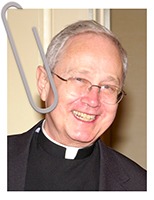Questions for Digital Passersby and Good Samaritans
Today I invite you to travel the road from Jerusalem to Jericho (Lk 10:35-37), via a drone. From the safety of our command center, we look down and see a man so badly beaten he can not cry out. The robbers have even taken his cell phone! (This post first appeared on FamVin.)
The scene unfolds. A priest walks down the road and pretends not to see him. A little behind him a Levite, a member of a privileged caste also passes by. Neither of these two digitally equipped passersby thinks to use his mobile phone to call for help. Finally, someone from a despised and outcast social group comes by. Unlike the others, he stops and tends to the victim… even to the point of bringing him to a safe place where he will be tended to.
Of course, there are many ways we can spin this story. Here I simply ask what is your reaction to the two who passed the victim by without pulling out their mobile phones to call for help? Why didn’t they at least call the highway patrol to send help?
The Voice of the Poor, the wounded on the road to Jericho today
A fanciful story. Yes! But it is a story that also raises questions about being the voice of the poor who have fallen victim to thieves. Hopefully, we will stop and bind up the wounds. The further very pointed question to each of us today is do we call for help? Do we alert the highway patrol? The questions do not stop there. Realizing the dangers of this particular stretch of the road do we lobby to increase the highway patrol or build safe places where people can rest in safety in their journey of life? I spin this version of a story Jesus told as a way of raising questions of advocacy and addressing root causes.
Uh, oh! There are those intimidating words. Advocacy! Root Causes! Before we get frustrated, let me ask a very simple preliminary question. How difficult is it for us to make phone calls?
I am an admirer of the Voice of the Poor initiatives of the Society of St. Vincent de Paul. They have a page on their website that makes a strong case for Vincentians to be the voice of the poor and those who are on the peripheries of our society.
Their insight is striking in its simplicity.
An important part of that mission is to bring the stories of the people we visit into the public spotlight. No other charity or social service agency visits people in their homes, listens to their stories, and offers such compassionate hope and aid. This puts us in a unique position to inform our elected representatives and our community how decisions affect the people for whom we care. In particular, we want to hold our elected representatives accountable for the decisions that they make that affect the poor.
My reaction is to ask myself the question how hard or complicated is it to make a telephone call? Keep in mind that advocacy works! It certainly seems to be easier than doing the home visits the members of the Society have been doing so well and quietly for centuries. Many of the visitors to this site are engaged in ministries of service to those living on the peripheries. We see things that others don’t see. As the saying goes “If you see something, say something!”
Maybe we are caught up in some myths about advocacy.
Here I highlight just a few Advocacy Myths…
I just don’t have the time.
Most of us don’t have a lot of extra time. But if we don’t speak out for our own rights on issues such as access to healthy foods and healthy workplaces, who will speak for us? On some issues, it takes as little as five letters or phone calls to tilt a policymaker’s opinion one way or the other.
I won’t make a difference.
Every voice makes a difference. Look at recent elections. The decision sometimes comes down to a few votes in a few states. Your opinion matters, but it only makes a difference if you make it known. The assumption that your voice won’t make a difference is what makes bad public policy possible.
Someone else will do it.
It is probably true that someone else will contact your legislator, but how do you know they are working for the same cause? There are many groups trying to get their voices heard. If they are talking and you are silent, how will anyone know your point of view? Your silence makes your opponents’ voices even louder. Absolutely no one is going to advocate for our priorities—except us. And in many cases others may be fighting against us. There are millions of Americans who share our goals and objectives. Think how easy it would be to change things if each person took only five minutes out of their day to make that phone call or write that letter.
I don’t know enough.
You don’t have to know all the details of a bill. Legislators don’t expect you to. All you have to know is why the bill is important. Elected officials put a high value on input from the people they represent.
With all of our talk about working smarter and systemic change hopefully, we will be able to move beyond these myths and our inertia.


Thank you,Father John, for quickening my conscience and for helping me examine my inertia.!
Gratefully, Faithfully,& By “His Grace Alone”…
Ed Ambrose (St. Joe’s,AA,1957)